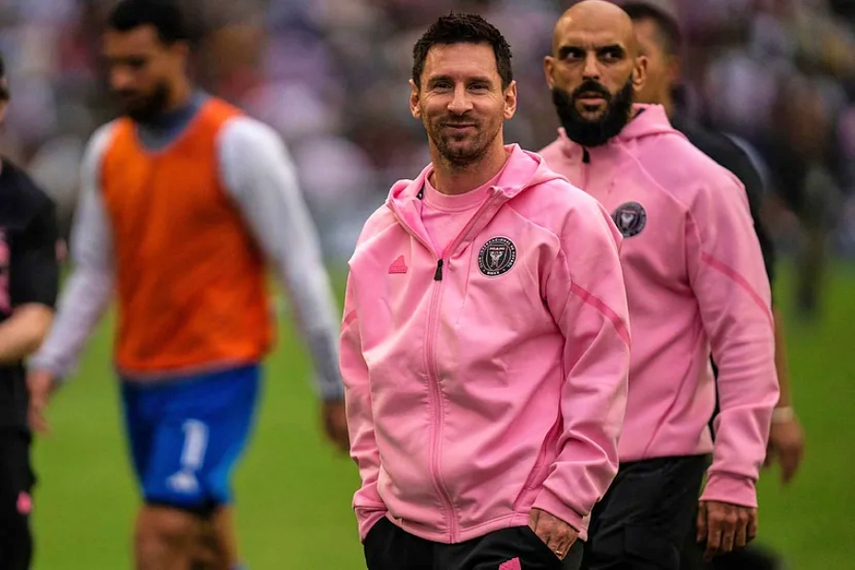
More than two weeks after Lionel Messi sat out a much-hyped Hong Kong friendly, for which fans paid substantial sums to watch the footballer in action, the Argentine star has taken to Weibo to apologise to “mainland Chinese and Hong Kong football fans.”
"I've heard people say that I didn't want to play (in Hong Kong) for political reasons and many other reasons that are totally untrue," Messi stated in a two-minute video posted on the platform. "Had that been the case, I wouldn't have even travelled to Japan or visited China as many times as I have."
The fallout from the controversy continues to reverberate. Post the game, official complaints were made against the organiser Tatler Asia, who pushed Inter Miami’s visit to Hong Kong. Amid the clamour for ticket refunds, Tatler apologised to football fans over Messi’s absence and offered a return refund to those who purchased match-day tickets via official channels. They also returned the HK$16 million government subsidy.
Messi and other marquee players—Luis Suarez, Jordi Alba, and Sergio Busquets—were contracted to play for 45 minutes unless injured. Tatler acknowledged that injuries are a part of the game, but “the seeming lack of respect shown to the crowd” was what upset the spectators, who paid up to HK$4,880 (US$624), far exceeding typical costs of HK$880 (US$113) to watch the world-class soccer player. Tatler also added they had pleaded with Inter Miami’s ownership and management to urge Messi to engage with fans and explain why he couldn’t play, but it was to no effect.
Messi’s apology clarifies that there were no underlying political motivations or diplomatic conspiracies behind Inter Miami’s decision to bench him. But the fact that right after the Hong Kong debacle, both Messi and Suarez took to the field in Tokyo on February 7 for 30 minutes “feels like another slap in the face,” Tatler said.
Messi and Inter Miami said he had a groin injury; however, anger spread to mainland China after he played for 30 minutes in Tokyo against Vissel Kobe two days later. The Hong Kong government remarked in a press statement: “Messi played with ease in the match in Japan just three days after . . . spending quite a long time on the pitch with some intense movement.”
Measured regret
In a two-minute Spanish video posted on Weibo with English subtitles, Messi clarified his position to his eight million followers:

"I've heard people say that I didn't want to play (in Hong Kong) for political reasons and many other reasons that are totally untrue. Had that been the case, I wouldn't have even travelled to Japan or visited China as many times as I have."
He also clarified his physical condition, emphasising that despite the discomfort and risk of exacerbating his injury, he felt fit enough to participate in a match in Tokyo two days later.
"I did all I could," he continued. "But I really couldn't play. I felt discomfort, and there was a risk it'd get worse."
He explained his condition improved later, and he took to the field in Tokyo. The Argentine star emphasised his "very close and special relationship with China."
Near the end of his video, he said he "always had and continues to have a special affection for" fans in China and hopes to see them again soon.
However, following the Tokyo game, China’s state-controlled newspaper, the Global Times, published an editorial to conclude that political motives drove Messi’s actions and that “external forces” aimed to humiliate Hong Kong.
As the uproar intensified on Chinese social media, the sports bureau in Hangzhou has scrapped the upcoming friendly match between Nigeria and World Cup champion Argentina—a team led by Messi—scheduled to take place in China next month. The official reasons behind this decision were left cryptic.
Can an apology mend fences in the Chinese market?

The football icon wields immense influence in China. His popularity attracts luxury brands. The recent Hong Kong misstep and subsequent two-week later apology may sway China’s consumer market. Messi rakes in millions through global brand partnerships.
Louis Vuitton named the star athlete its brand ambassador in 2022—the French luxury house earns 32% of its sales revenue from Asia, most of that from China and then Japan. The loss of exposure and income in a market boasting over 1.4 billion consumers could prove detrimental not only to Messi's finances but also to his global image.
In China alone, endorsements include major Chinese companies like the dairy brand Mengniu and the liquor brand Chishuihe, among others. According to reports, the Erguotou deal from 2022 pays Messi 20 million RMB ($2.7 million) annually for a three-year partnership. Erguotou is caught in the crossfire with online fury and calls to cancel the superstar on its Douyin account.

Asian delivery giant J&T Express also inked a deal with Messi in Hong Kong in November 2022 to grow brand awareness and position J&T Express as a one-stop e-commerce specialist in the 13 countries (Indonesia, Vietnam, Malaysia, the Philippines, Thailand, Cambodia, Singapore, China, Saudi Arabia, the UAE, Mexico, Brazil, and Egypt) it operates. Messi’s earning potential and global image could take a hit if these partnerships dissolve under mounting pressure from disgruntled fans.



.jpg&h=334&w=500&q=100&v=20250320&c=1)
.jpg&h=334&w=500&q=100&v=20250320&c=1)
.jpg&h=334&w=500&q=100&v=20250320&c=1)



.jpg&h=334&w=500&q=100&v=20250320&c=1)
.jpg&h=334&w=500&q=100&v=20250320&c=1)








.png&h=268&w=401&q=100&v=20250320&c=1)